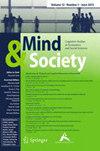大五人格特质、自我同情与大学生心理健康
Q1 Arts and Humanities
引用次数: 0
摘要
大学生心理健康问题的发生率和严重程度在全球范围内呈上升趋势。在学生令人担忧的心理健康问题上,印度也站在同一个平台上。然而,到目前为止,大多数研究仅限于评估心理问题的流行程度和结果,调查学生心理健康保护因素的研究很少。随着健康致生方法的出现,对健康保护因素的研究兴趣,而不是危险因素,已经大大提高。鉴于此,本研究探讨了人格特质和自我同情在大学生心理健康中的作用。采用相关研究设计。被试以大学生为研究对象,采用Costa和mcrae(1992)的neo -五因素量表、Neff(2003)的自我同情量表和Jagadish and Srivastava(1983)的心理健康量表进行评估。数据分析采用Pearson相关和多元线性回归分析。外向性、宜人性和自我同情与心理健康呈正相关,而神经质与心理健康负相关。OCEAN人格特质和自我同情解释了心理健康的显著差异,只有外向性正向显著预测心理健康。外倾性是大学生心理健康的保护因素。本文章由计算机程序翻译,如有差异,请以英文原文为准。
Big-Five Personality Traits, Self-Compassion and Mental Health among University Students
The occurrence and severity of mental health issues among university students is increasing globally. India is also on the same platform when it comes to alarming mental health issues among students. However, most studies so far have been limited to assessing the prevalence and outcomes of psychological issues, and a paucity of studies investigating the protective factors for students’ mental health was observed. With the advent of the salutogenic approach, the research interest in health-protective factors, as opposed to risk factors, has heightened drastically. Given this, the present work investigated the role of personality traits and self-compassion in university students’ mental health. A correlational research design was employed. Participants included university students assessed on Costa and McCrae’s (1992) NEO-Five Factor Inventory, Self-Compassion Scale (Neff, 2003), and Mental Health Inventory (Jagadish and Srivastava, 1983). Data analysis employed Pearson’s correlation and multiple linear regression analysis. Extraversion, agreeableness, and self-compassion were positively associated with mental health, whereas neuroticism was negatively associated. The OCEAN personality traits and self-compassion explained significant variance in mental health, and only extraversion positively and significantly predicted mental health. OCEAN Personality Trait Extraversion is a protective factor for university students’ mental health.
求助全文
通过发布文献求助,成功后即可免费获取论文全文。
去求助
来源期刊

Mind and Society
Arts and Humanities-Philosophy
CiteScore
2.30
自引率
0.00%
发文量
5
期刊介绍:
Mind & Society is a journal for ideas, explorations, investigations and discussions on the interaction between the human mind and the societal environments. Scholars from all fields of inquiry who entertain and examine various aspects of these interactions are warmly invited to submit their work. The journal welcomes case studies, theoretical analysis and modeling, data analysis and reports (quantitative and qualitative) that can offer insight into existing frameworks or offer views and reason for the promise of new directions for the study of interaction between the mind and the society. The potential contributors are particularly encouraged to carefully consider the impact of their work on societal functions in private and public sectors, and to dedicate part of their discussion to an explicit clarification of such, existing or potential, implications.Officially cited as: Mind Soc
 求助内容:
求助内容: 应助结果提醒方式:
应助结果提醒方式:


